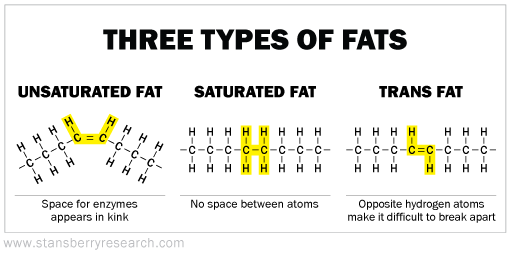Doc's note: Last week, we busted some of the top financial myths folks believe are true. This week, we're covering the biggest myths in the health industry.
We're starting off strong with a myth most people believe... Fat is bad for you.
***
I'm about to give you some controversial advice: You need to eat fat.
Today, we're going to break down the difference between fat to embrace and avoid. And we'll and show you how to add healthy fats to your diet.
There are three main types of fats:
- Unsaturated fats
- Saturated fats
- Trans fats
All fats consist of chains of carbon atoms with attached hydrogen atoms. Take a look:

Unsaturated fats are the easiest for us to break down – just look at that space in the middle. It allows enzymes to get in and break down the fat more easily.
Unsaturated fats occur in plenty of natural foods... They consist of monounsaturated fatty acids ("MUFAs") and polyunsaturated fatty acids ("PUFAs").
MUFAs have a single double bond (highlighted in the figure), whereas PUFAs have more than one – the more spaces, the easier they are for your body to break apart and use.
MUFAs, PUFAs, omega-3s, and some omega-6s are great for your health. MUFAs keep our insulin levels in check. And as we've said many times about the good fats in olive oil, they protect your heart as well.
Saturated fats occur both naturally (in foods like avocados) and as a chemical product (in foods like margarine). The problem is the evidence isn't clear on how much (if any) damage they might do.
Part of the concern regarding saturated fats is that some types may be worse than others. Newer research suggests that it depends on how long the carbon chain is. It's one of the reasons coconut oil became popular – because it's a medium-chain saturated fat. Unlike long-chain saturated fats, the liver breaks down medium-chain fats easily.
This goes along with what I've always said, too: Natural sources are better than processed foods. This holds true for saturated fats. So don't cut out foods like avocados, whole milk, red meat, and cheese just because of the saturated fats.
On the other hand, it's clear that trans fats are terrible for you. The vast majority are man-made (a few occur naturally in beef, lamb, and butterfat). They're difficult for your body to break down. (The enzymes don't have enough space to get in there to break it apart.) And they send your immune system into overdrive, promoting inflammation and wreaking havoc on your body.
Researchers from Harvard found that people who ate "bad" fats – especially trans fats –lowered their life expectancy. Researchers followed about 125,000 people over the course of 30 years. What they found was that, when measuring calorie intake, every 2% increase in the amount of trans fats that people ate corresponded with a 16% higher risk of early death.
However, they also found the more PUFAs and MUFAs people consumed, the lower their risk of early death. This is why eating the right kind of fats is critical.
How to Get the Right Fats
Here are my tips on how to make good choices when it comes to eating fat:
- Make two or three days each week meat-free.
- Eat good fatty fish, like salmon and tuna.
- Eat vegetables every day. Aim to see a rainbow of color in the foods on your plate.
- Cook with extra-virgin olive oil.
- Read the nutrition labels on packaged food, and steer clear of trans fat.
- The fewer processed foods you eat, the better.
- Don't avoid fat by opting for a low-fat or non-fat version of your food.
- Check out the Mediterranean diet. This is widely considered one of the best ways to eat.
- And one of my best tips is – all things in moderation. Making small, incremental adjustments toward eating better makes a big difference. Enjoy your food wisely, the health and wealth way.
Here's to our health, wealth, and a great retirement,
Dr. David Eifrig and the Health & Wealth Bulletin Research Team
December 27, 2022
